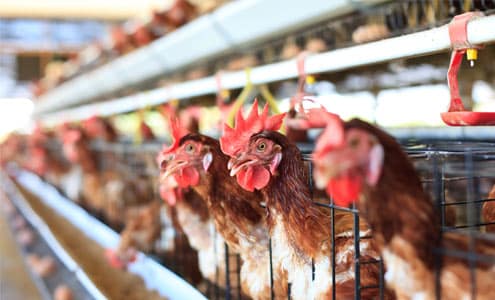
(HealthyResearch)- by Janet Valenty, Wellness Contributor
The term “cage-free” often brings to mind chickens who roam around freely on a farm or in a pasture of some sort, running about, pecking for food, and enjoying the pleasant sunshine afforded in this type of environment. When many agribusinesses switched to cage-free chickens, many consumers began purchasing the new products, believing that they were making a difference by supporting more humane living conditions for egg-producing chickens. The reality is not what you might think.
Why Cage-Free Began in the First Place
Chicken eggs are available all across the country, in every state, county, city, and township that provides grocery stores. Providing all of the eggs necessary for customer demand is nothing more than big business. In order to provide the most eggs at the least cost to maximize profit, egg producers kept hens packed in cages secured above a type of shelf or conveyor belt that eggs fell on as they were laid. A warehouse can hold many layers of these cages and shelves in a small area.
Caged chickens do not touch the ground and have no room to flap their wings or even to turn around. They do not have the opportunity to engage in normal chicken behaviors, such as dust bathing, flapping, walking, perching, laying eggs in nests, and pecking for food, according to the Humane Society. Unsanitary conditions combined with inhumane treatment of the chickens led to public outrage and the development of safer and more humane conditions for egg-laying hens.
The Real Meaning Behind Cage-Free
Enter the cage-free movement. Some large agribusinesses began providing chickens a cage-free environment to better allow for more natural chicken behavior throughout their short lives. Chickens live in a warehouse but are not confined to a cage, allowing for walking, pecking, and wing flapping. Closer to the ceiling, rods are available for chickens to perch whenever they like. Chickens can lay their eggs in nests. The dirt floors allow for dust-bathing as well.
This sounds a lot better than what caged chickens go through, but it is only by a little. Although the chickens are free to engage in a few natural chicken behaviors, that is where the benefits end. The term “cage-free” means just that. These chickens are still packed by the thousands and tens of thousands in warehouses or barns. Although they can move around, they are still running into each other and never go outside. Beaks are still cut or burned to reduce injury or death to other hens due to overcrowding. According to an article for NPR, these chickens may feel that they have more freedom than their caged counterparts, but they still live in similar conditions. Cage-free hens dust-bathe on floors in their own excrement, and are twice as likely to die in the first year as hens that live in cages. Cage-free is not really all that free when you think about it.
Purchasing from local farmers and farmer’s markets can provide fresher, safer eggs as long as the eggs were refrigerated shortly after harvest. Also, look for eggs marked “Pasture Raised” which claim to allow each of their hens 100+ square feet of individual space outdoors, with the freedom to forage for their own food. Be sure to wash the outside shells with hot, soapy water before storing them in your refrigerator. Pasteurized eggs kill most harmful bacteria without cooking the egg and are a good choice for the young, the elderly, and those with health problems. They are also the best choice for any recipes requiring raw eggs like fresh mayonnaise. With proper care for selection, storage, and cooking, you can enjoy eggs with little risk from contamination.
What About Organic Eggs?
Organic eggs assure that the hens have not been given vaccines or antibiotics, and have only been fed grains raised on land that has been free of toxic chemical pesticides and fertilizers for at least 3 years. However, in regard to the subject matter in this article, the caging systems, or lack thereof for cage-free and pasture-raised hens, do not come into play. Organic eggs may come from caged hens.
How to Know if You Bought a Good Egg
When purchasing eggs, open the carton and check for eggs that are cracked or discolored. Check the 3-digit code, or Julian date, to see what day of the year the eggs were packed and cleaned. For example, if the 3-digit code says 030 then you know the eggs were packed on the 30th day of the year or January 30. Expiration dates can occur more than a month after the eggs were harvested. Both regularly packaged eggs and those with cage-free labels may produce health risks when produced in unsafe environments. It is common to hear about eggs being recalled due to salmonella fears or other health issues. Thoroughly cooking your eggs can reduce any potential risk.
Thank you to our friends at Wellness.com for contributing this piece!
Copyright 2021, HealthyResearch.com
















